To camp eco-friendly, choose sustainable gear like tents made from recycled materials. Pack light and use reusable products to minimize waste. Plan your meals to avoid food waste, and select designated campsites that protect ecosystems. Always respect local regulations and wildlife guidelines. Minimize energy use by using solar power, and bring biodegradable products for hygiene. By following these simple practices, you’ll not only enjoy nature but also help preserve it. There’s more you can do to make a difference!
Key Takeaways
- Opt for tents made from 100% recycled materials and choose brands with bluesign certification for responsible production practices.
- Pack reusable utensils, plates, and a stainless steel water bottle to minimize single-use plastics and waste during your trip.
- Follow Leave No Trace principles by selecting designated campsites and properly disposing of waste to protect the environment.
- Use biodegradable soaps and natural insect repellents to safeguard water sources and minimize ecological impact.
- Embrace minimalism by packing lightweight, multipurpose gear to reduce energy consumption and support sustainable camping practices.
Choose Sustainable Gear
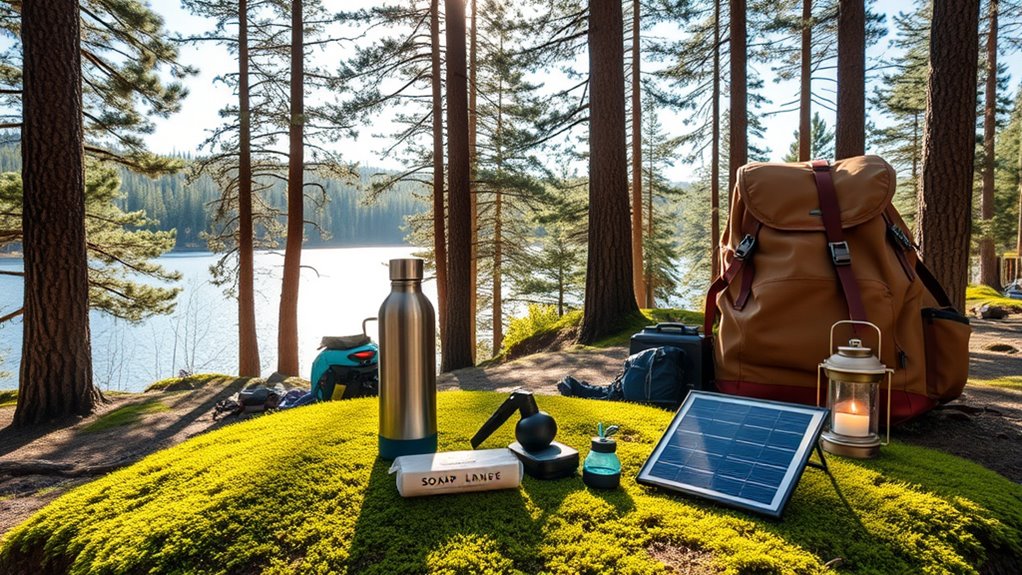
When you choose sustainable gear for your camping adventures, you not only enhance your experience but also protect the environment. Opt for tents made from 100% recycled materials, like those from Kammok, which offer durability and eco-friendliness. Look for brands that carry bluesign certification, such as NEMO Equipment, ensuring responsible production practices. You can also consider biodegradable tents crafted from bamboo or hemp, providing a natural alternative to traditional options. Tents made from recycled polyester or organic cotton significantly reduce your environmental impact. Many companies focus on innovative designs that maximize functionality while minimizing waste; these brands are making outdoor exploration greener. Additionally, using sustainable materials in your camping gear can further reduce your ecological footprint. Incorporating natural materials in your camping gear, like wooden utensils or organic cotton sleeping bags, contributes to a healthier planet while enjoying your time in nature. Using gear made from recycled materials not only helps minimize waste but also supports eco-friendly manufacturing processes.
Pack Light
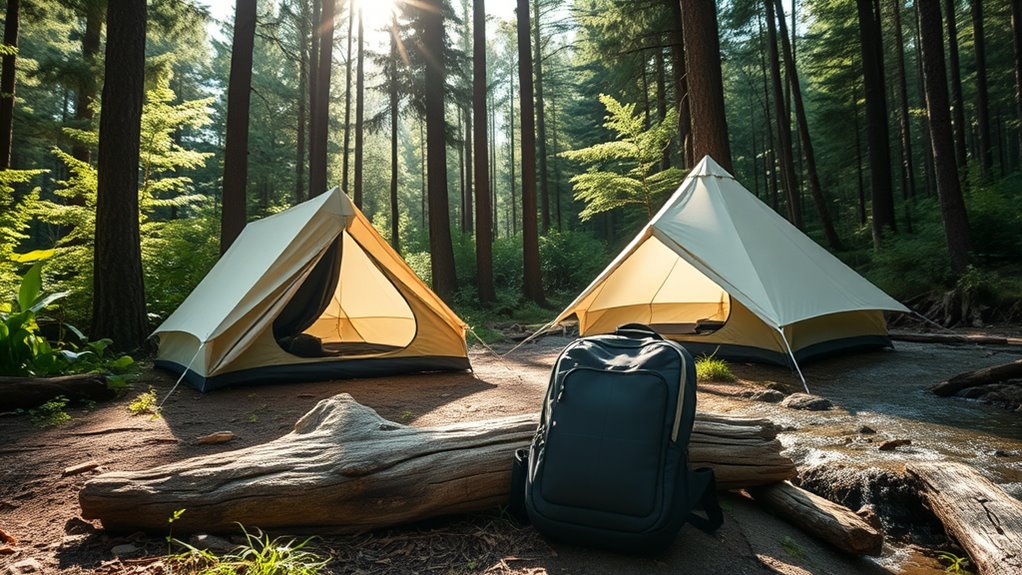
Packing light not only makes your camping experience more enjoyable but also benefits the environment. By choosing lightweight gear, you reduce the overall weight you carry, which decreases energy consumption during transportation. Additionally, using a reusable water bottle helps avoid single-use plastics, further supporting sustainable practices while you camp. A balanced approach to packing can also ensure that you bring along essential nutrients that keep you energized and healthy during your outdoor adventures.
With fewer items, there’s less chance of losing or misplacing your gear. Opt for multipurpose items to minimize space and waste, allowing for efficient packing that saves you time and effort. This practice supports the Leave No Trace principles, as it reduces littering and your carbon footprint, while also mitigating the environmental impacts associated with excessive resource consumption. Using sustainable wood fuel can also enhance your eco-friendly camping experience. Use compressible gear, select versatile clothing, and pack only what you truly need.
A checklist can help ensure you don’t overlook essentials. Embrace minimalism for a more eco-friendly camping adventure!
Plan Ahead
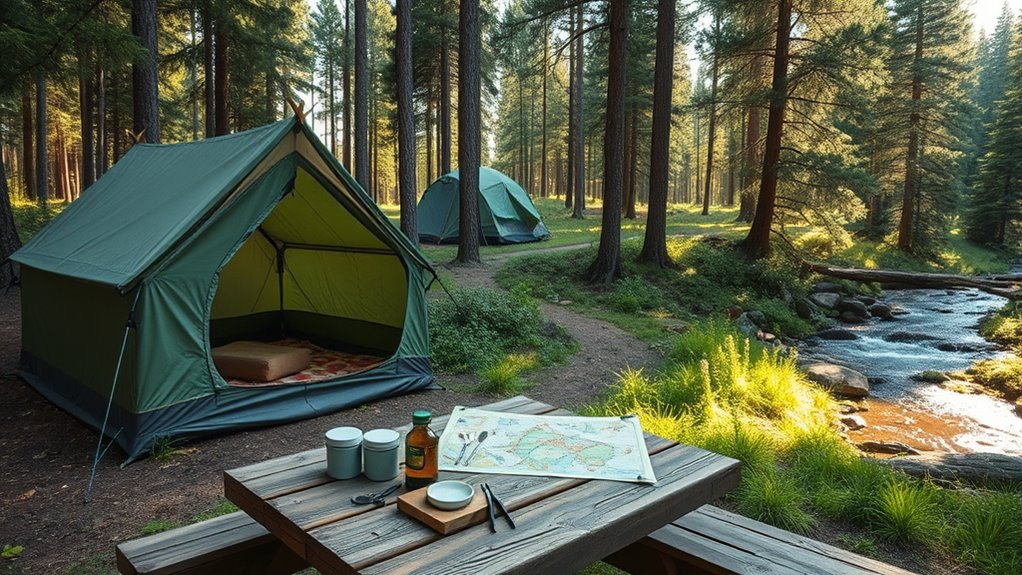
Planning ahead is crucial for an eco-friendly camping experience, as it not only enhances your enjoyment but also helps protect the environment.
Start by researching local regulations regarding campfires, waste disposal, and wildlife interactions. Familiarize yourself with the weather and season to pack the right gear. Additionally, understanding the importance of seasonal gardening practices can inspire you to extend your eco-friendly mindset beyond camping. Sustainable living is about making mindful choices that benefit the planet. Consider exploring local cultural festivals that promote environmental awareness in the areas you visit.
Research local regulations on campfires and waste disposal to ensure a responsible camping experience.
Consider camping during off-peak times to lessen the strain on popular sites and look for campsites certified by green organizations. Understanding local flora and fauna helps you avoid hazardous encounters.
Learn about the potential environmental impacts, like soil erosion, and commit to “Leave No Trace” principles. Additionally, incorporating sustainable practices in your meal planning and packing strategies can significantly reduce your ecological footprint.
Plan your meals to reduce food waste and choose reusable or biodegradable items to minimize your footprint.
Preparing well ensures a sustainable adventure.
Select Eco-Friendly Campsites
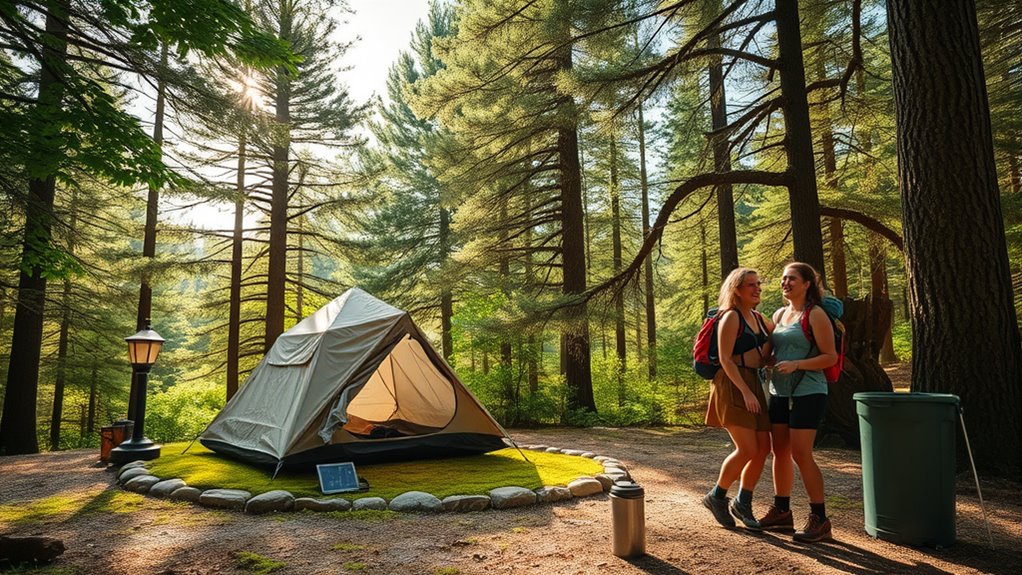
Selecting eco-friendly campsites is essential for reducing your environmental impact while enjoying the great outdoors. Choose designated campsites to minimize soil erosion and protect fragile ecosystems. Look for areas rich in biodiversity, as they’re often more resilient to human activities. Staying at least 70 meters away from any water source is crucial to prevent contamination from human activities and safeguard aquatic habitats. Additionally, consider the site’s proximity to natural landmarks, which can help with navigation and enhance your overall camping experience. Assess the campsite’s infrastructure for sustainable practices, like recycling facilities and solar-powered amenities. Many eco-friendly sites also implement advanced filtration systems to improve air quality, contributing to a healthier environment. You may also want to consider campsites that allow solar panels for camping to ensure a sustainable energy source during your stay. Always respect wildlife habitats by avoiding sites that disturb sensitive ecosystems. By prioritizing these factors, you’ll contribute to preserving nature while still having a memorable camping experience.
Use Reusable Products
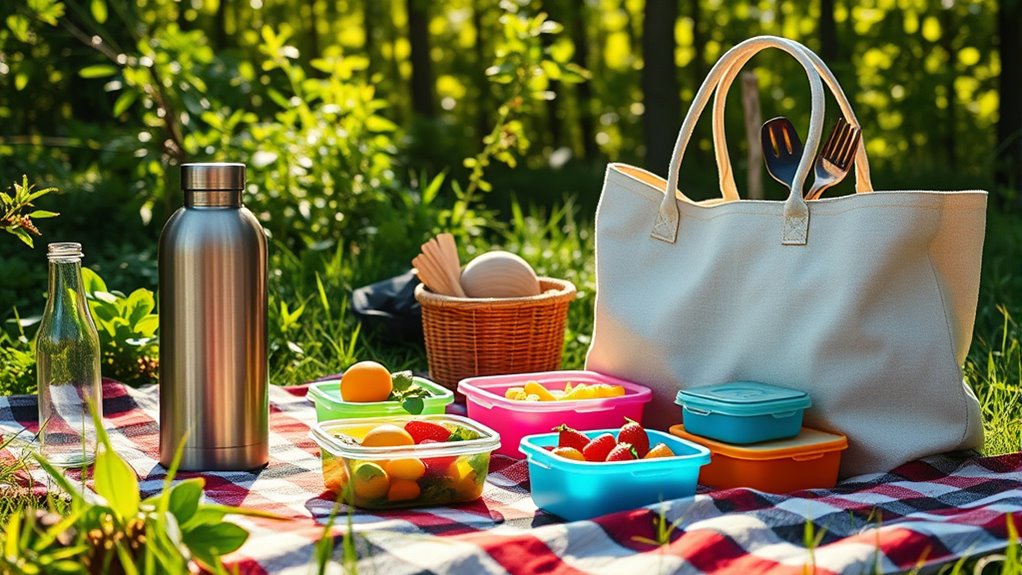
Using reusable products while camping is a simple yet impactful way to reduce waste and protect the environment. Start by bringing a stainless steel or glass water bottle to minimize reliance on disposable plastics. Opt for reusable plates, cups, and utensils, which can be washed and used again, cutting down on single-use items. Consider bamboo camping utensils—they’re lightweight, durable, and compostable. Use recyclable packing containers for meal prep to keep things organized and eco-friendly. Lastly, pack biodegradable trash bags for responsible waste management. Incorporating sustainable camping supplies into your gear not only helps the environment but also enhances your outdoor experience.
Conserve Water
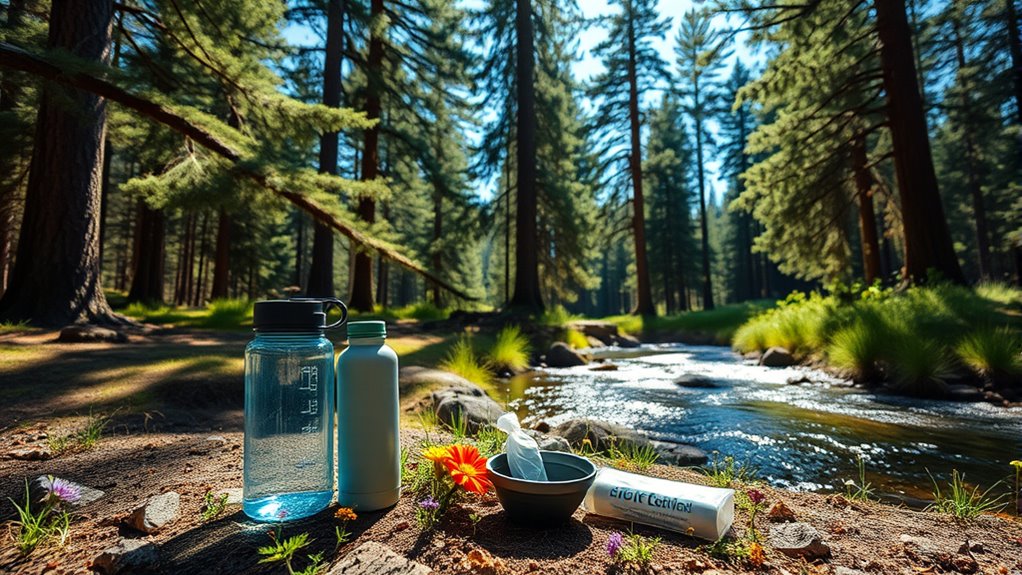
When you’re out camping, conserving water is crucial not just for your needs but also for protecting the environment. Start by calculating your daily water needs for drinking, cooking, and hygiene. Responsible water management enhances outdoor experiences and protects fragile ecosystems from degradation. Additionally, understanding the importance of long-term financial planning can help you invest in eco-friendly camping gear that minimizes water usage. Regular maintenance of camping gear, such as waterproofing treatments, can also help ensure that you use less water for cleaning and upkeep.
Conserve water while camping to protect the environment; calculate your daily needs for drinking, cooking, and hygiene.
Choosing camping locations near reliable water sources can also reduce the need to carry excessive amounts of water. Choose efficient routes that allow for water refills, minimizing excess weight. Monitor local water sources to avoid shortages. Prepare meals using dehydrated foods that require less water.
For storage, use collapsible containers and jerry cans. Employ water-efficient hygiene practices, like short showers or “Navy showers,” and consider using wet wipes when water is scarce.
Opt for low-water cooking methods and catch and reuse water when possible. By integrating these practices, you’ll help ensure that water remains available for everyone while enjoying the great outdoors.
Minimize Energy Use
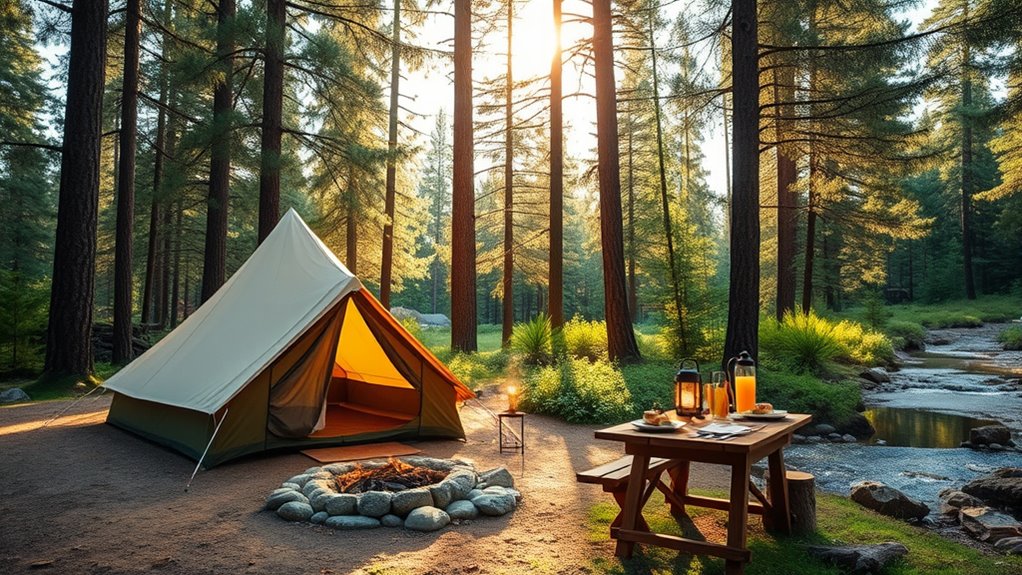
To enjoy your camping experience while being kind to the environment, it’s essential to minimize energy use.
Start by harnessing solar power with portable solar panels to charge your devices and appliances without relying on traditional power sources. Sustainable energy systems ensure reliable power with minimal ecological footprint, making them an excellent choice for eco-friendly camping. Additionally, consider incorporating energy-efficient designs in your gear to further reduce energy consumption while enjoying the great outdoors. It’s noteworthy that energy-efficient systems can significantly lower energy bills over time. Moreover, adopting integrated pest management practices, similar to those used in sustainable agriculture, can enhance your overall eco-friendly approach.
Consider using energy-efficient gear and LED lighting, which can save up to 75% more energy than conventional options. Opt for rechargeable batteries to cut down on waste, and avoid unnecessary electronics to reduce overall energy demand.
Manage your energy consumption habits by parking in shaded areas and using natural temperature control.
Pack Out All Waste
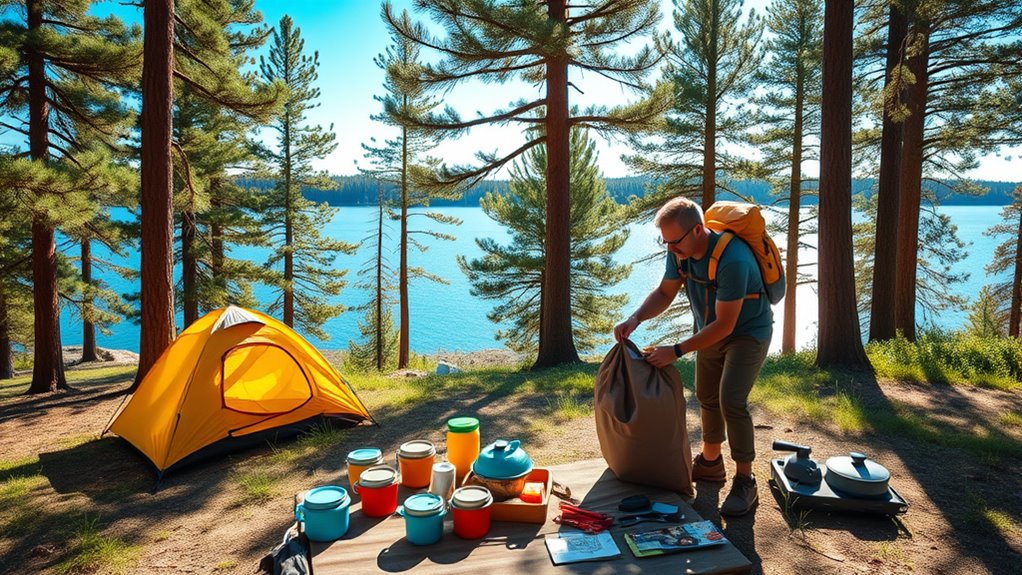
Packing out all waste is crucial for preserving the natural beauty of camping sites. As a camper, you generate about one pound of waste each day, including organic scraps and single-use plastics. To minimize this, choose items with minimal packaging and invest in reusable gear like stainless steel plates and cutlery. Additionally, using energy-efficient models for cooking can also help reduce your overall environmental impact. Consider composting food scraps to enrich the soil and reduce landfill contributions. Furthermore, incorporating essential survival gear can enhance your preparedness during camping trips. Additionally, being aware that the average camper generates approximately one pound of waste daily can help you plan accordingly.
Always separate your waste into recyclables, non-recyclables, and organics for proper disposal. If you’re in sensitive areas, use specialized kits for human waste.
Respect Local Regulations
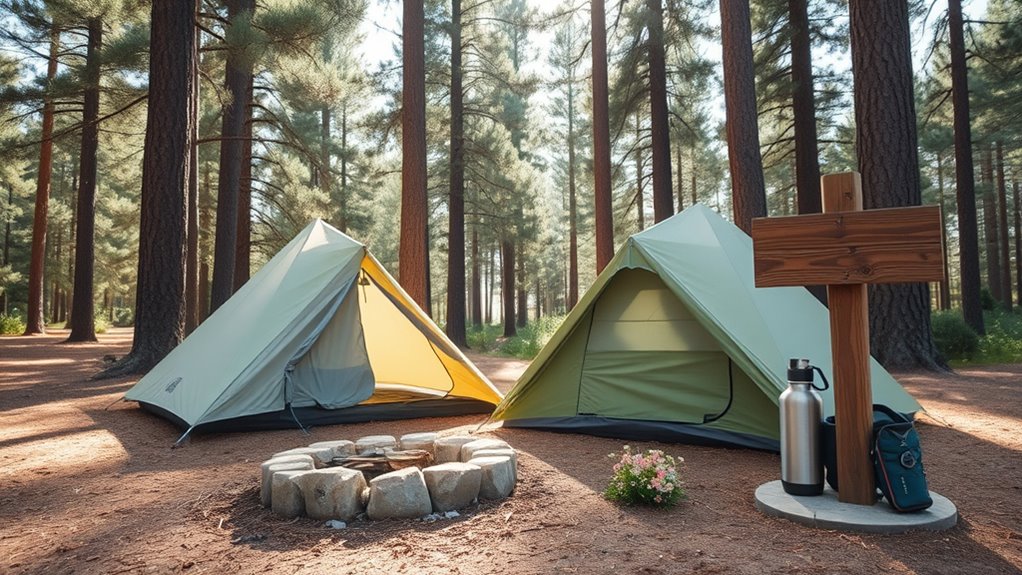
Respecting local regulations is vital for ensuring a safe and enjoyable camping experience while protecting the environment. Familiarize yourself with campfire restrictions to avoid potential hazards, and always follow rules about wildlife protection. Make sure you camp only in designated areas and adhere to water usage guidelines to conserve this precious resource. Compliance with waste disposal regulations is equally important; dispose of your trash properly to prevent pollution. If you’re in protected areas like national parks, stick to marked trails and never feed wildlife, as it disrupts their natural behaviors. Additionally, being aware of sustainability certifications can help you choose campgrounds that prioritize environmental responsibility. Understanding how state taxes may affect your outdoor recreation budget can also enhance your planning for eco-friendly camping trips. It’s essential to consider early withdrawal penalties when planning your finances for camping excursions to ensure you remain within budget. Choosing designated camping areas reduces environmental impact and promotes responsible outdoor practices.
Use Biodegradable Products
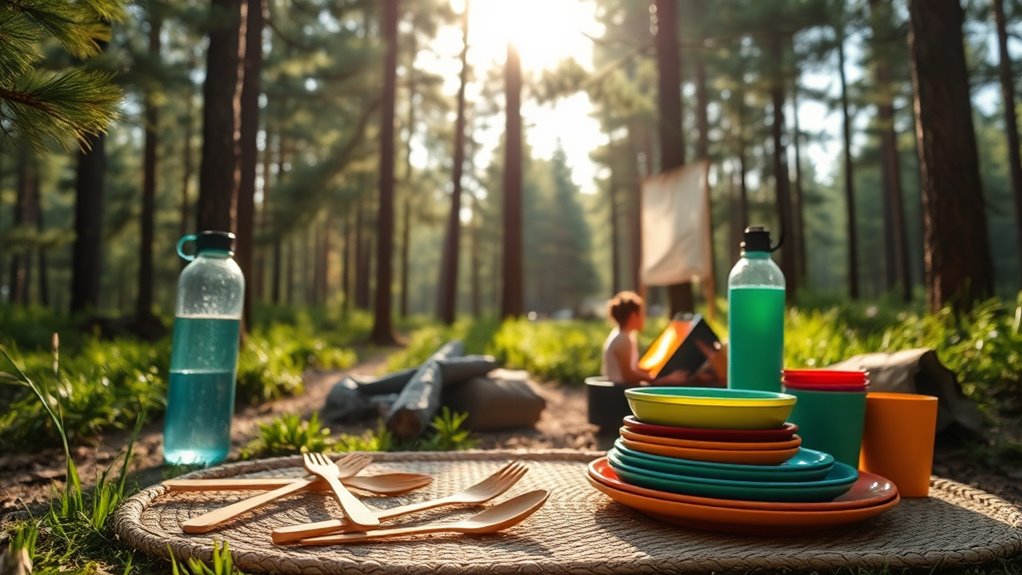
Using biodegradable products while camping can significantly reduce your environmental impact. Opt for biodegradable soaps, shampoos, and conditioners that break down naturally and protect local water sources. Additionally, using biodegradable personal care products ensures that harmful chemicals do not contaminate the surrounding ecosystem.
Replace traditional dental care with bamboo toothbrushes and toothpaste tablets. For sun protection, choose eco-friendly sunscreens that safeguard your skin without harming the environment. Natural insect repellents made from plant-based ingredients offer effective protection without ecological harm.
When it comes to dining, use compostable plates, bowls, and utensils made from sustainable materials like sugarcane and bamboo. These options decompose easily, helping to minimize plastic waste.
Frequently Asked Questions
What Are the Benefits of Eco-Friendly Camping?
Eco-friendly camping offers numerous benefits that enhance your outdoor experience.
You help protect natural habitats and conserve wildlife by minimizing your impact on ecosystems. Using sustainable gear and efficient resources not only reduces waste but also saves you money in the long run.
You’ll enjoy a healthier camping experience by opting for organic food while supporting local economies.
Plus, connecting with nature boosts your mental well-being, promoting a sense of peace and fulfillment.
How Can I Choose the Right Eco-Friendly Campsite?
To choose the right eco-friendly campsite, start by prioritizing established sites that minimize environmental impact.
Look for areas with durable surfaces like dirt or gravel to protect vegetation.
Check for eco-tourism certifications and research online about their green initiatives. Supporting local communities can enhance your experience.
Remember to follow Leave No Trace principles and respect wildlife, ensuring your adventure is both enjoyable and sustainable for the environment.
What Eco-Friendly Cooking Methods Can I Use While Camping?
Sure, because who wouldn’t want to cook over a roaring campfire while leaving a trail of smoke behind?
But if you’re looking to keep things eco-friendly, try solar cooking or portable stoves instead.
One-pot meals save time and energy, while no-cook options make life easier.
Pack reusable cookware and biodegradable utensils to minimize waste.
How Do I Find Biodegradable Personal Care Products?
To find biodegradable personal care products, start by checking labels for terms like “biodegradable,” “natural,” or “eco-friendly.”
You can explore local health stores or online retailers specializing in sustainable products. Look for solid shampoo bars, bamboo toothbrushes, and biodegradable soaps.
Reading reviews helps you gauge effectiveness while ensuring they meet your needs.
Don’t forget to support brands committed to environmentally friendly practices, making your choices more impactful!
Can I Camp in a National Park Sustainably?
Yes, you can camp sustainably in a national park!
Start by selecting eco-friendly campsites and packing reusable gear to minimize waste. Always follow park regulations and practice Leave No Trace principles to protect the environment.
Opt for local, organic food to lower your carbon footprint and bring compostable waste bags.
Be mindful of wildlife and their habitats, ensuring you leave the park as beautiful as you found it.
Enjoy your sustainable adventure!
Conclusion
As you embark on your eco-friendly camping adventure, remember that every small choice can ripple through nature like a pebble in a pond. By choosing sustainable gear and leaving no trace, you’re not just protecting the environment; you’re becoming a steward of the great outdoors. So, pack your spirit of adventure and respect for the wild, and watch as your efforts bloom into a greener, more vibrant world for generations to come. Happy camping!









